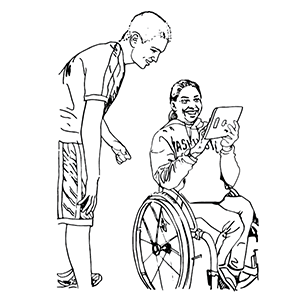Case Study: Angela

I recently graduated from Gonzaga University in Spokane, Washington, with my bachelor’s degree in psychology, and I was recently hired as a Family Service Coordinator at the Seattle Children’s Hospital Autism Center. Ultimately, I plan on getting my Ph.D. to become a clinical psychologist and working with people with disabilities to find psychosocial interventions and happy disability management.
The summer after I graduated from high school, I applied for an internship with the Center for Neurotechnology (CNT) because I knew I wanted to go into the medical field. I worked in Professor Bill Mooney’s neurobiology lab at the University of Washington, researching the effect of cannabinoid receptor blockers on the activity levels in a mouse cerebral cortex slice. We applied cannabinoid receptor antagonists to look at the different activity levels of a mouse brain and how cannabinoid receptors influenced these neural pathways.
I have a form of congenital myopathy called SEPN 1, which falls under muscular dystrophy. Though I’ve had symptoms since the age of two, we weren’t able to officially diagnose me until I was seventeen, because my disease is so rare. I use a scooter to travel longer distances. It really meant a lot to me when I saw that the CNT had designed their building to be fully accessible—it showed me that they were dedicated to incorporating people with disabilities into their work. They were also very willing to work with me on whatever accommodations I needed, which was mainly just adjustable furniture and access for my scooter.
During this internship, I didn’t only learn about my project, but how science teams collaborate. I learned the importance of communication about every single aspect of the projects, and how teamwork can divide up the work in a way that allows everyone to bring their strengths to the table. I can often be hard on myself and expect myself to know everything, so it was also a big learning experience for myself to realize how much I didn’t know, as well as how to ask questions and clarify what I was learning. No one is going to know everything from the beginning—that is the point of research!
The advice I’d give to both students with disabilities who want to engage in engineering research and faculty is don’t be afraid to ask questions. Working in a lab with a disability can often require a lot of communication. If a situation is well explained first, then a faculty member can understand why certain accommodations are necessary, and the student can feel comfortable and confident in knowing their needs will be met. Often an accommodation can come from a discussion between the faculty member and student about how the lab works or how a specific project needs to be done.
I’d highly recommend for all students with disabilities to follow their passion and get involved in research. Not only did it give me the skills I needed for later projects, but it was extremely rewarding to know I was working on something that could later be used in the engineering or medical community. A lot of students may feel scared that research may be too difficult; however, I would challenge that perspective and tell all students that they won’t know until they try.